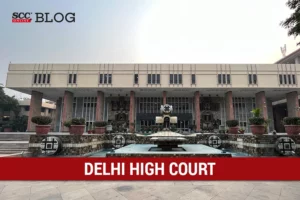Delhi High Court: In a case wherein an application was filed by the plaintiff to seek removal the offending article titled as ‘Indian Catholic Church Sex Scandal: Priest exploiting nuns and Hindu women exposed’ from the defendants’ website, Jyoti Singh, J., opined that irreparable harm and injury would be caused to the plaintiff’s reputation, if the defamatory article continued on the social media platforms of the defendants. The Court thus, passed an ex parte ad-interim injunction against the defendants, thereby, directing the defendants, their partners, directors, servants, agents and/or any other person acting on their behalf to remove the offending article available at the website of Defendants 1 and 2.
Background
The plaintiff was the principal of a reputed unaided recognized minority School affiliated to Central Board of Secondary Education and the name of the plaintiff was being deliberately omitted in the present order for the sake of anonymity and reputation. Defendants 3 and 4 were Limited Liability Companies incorporated in USA and were service providers to Defendants 1 and 2 for running their website over their domain on renewal basis. It was alleged that to malign the plaintiff’s image, the defendants published objectionable and obscene articles titled ‘Indian Catholic Church Sex Scandal: Priest exploiting nuns and Hindu women exposed ‘, comprising of allegations related to sexual intimacy and exploitation of nuns and Hindu women associated with the church on the defendants’ website . It was also claimed in the article that the plaintiff was engaged in sexual activities with staff members, chefs and students and had also been accused of financial wrongdoings.
The plaintiff stated that he not been involved in any sexual activity ever, as alleged, or had done financial wrongdoing in any manner. The plaintiff submitted that the article had been published only to harm his reputation and of the missionaries and also to prejudice the elevation of the plaintiff to a hierarchical position, on which he was expected to be appointed soon. Moreover, the article was published without verification of the allegations and thus, lead to tarnishing plaintiff’s image, reputation and goodwill.
The plaintiff submitted that the article/URLs/Weblinks that had been uploaded, shared, and disseminated on the defendants’ portals were available for public viewing both in India and abroad and were gravely damaging his reputation in schools/other Institutions with which he was associated and amongst students and staff. It was further submitted that the defendants had not removed the article despite legal notices being sent to them. The plaintiff thus pleaded that the right to reputation was a fundamental right under Article 21 of the Constitution and needed to be protected. Thus, the plaintiff prayed that directions should be issued to remove the offending article from the public domain to save any further damage to the plaintiff’s reputation.
Analysis, Law, and Decision
The Court opined that there was merit in the plaintiff’s contention that the article had been published in a reckless manner without any factual verification and was tarnishing the image and reputation. The Court observed that though Article 19(1)(a) of the Constitution provided the right of freedom of speech and expression to all people, however, it could not be overlooked that the same was subject to restrictions under Article 19(2) of the Constitution which included defamation, i.e. it could not be taken as an unfettered right so as to defame and tarnish the reputation of any person.
The Court relied on , (2016) 7 SCC 221, wherein the Supreme Court observed that protection of individual right was imperative for social stability in a polity and when harm was caused to an individual the society as a whole was affected, and “there is a link and connect between individual rights and the society; and this connection gives rise to community interest at large. It is a concrete and visible phenomenon. Therefore, when harm is caused to an individual, the society as a whole is affected and the danger is perceived.”
Further the Court observed that the balance of convenience also lies in favor of the plaintiff and against the defendants. The Court opined that irreparable harm and injury would be caused to the plaintiff’s reputation, if the defamatory article continued on the social media platforms of the defendants.
The Court thus, passed an ex parte ad-interim injunction against the defendants, thereby, directing the defendants, their partners, directors, servants, agents and/or any other person acting on their behalf to remove the offending article available at the website of Defendants 1 and 2.
[XYZ v. Bharat Prakashan (Delhi) Ltd., 2023 SCC OnLine Del 5069, Order date 16-08-2023]
Advocates who appeared in this case :
For the Petitioner: Mr. Sumit Bansal, Mr. Pankaj Gupta, Mr. Udaibir Singh Kochar, Ms. Tulna Rampal, Ms. Surbhi Tandon and Mr. Aditya Bakshi, Advocates.

